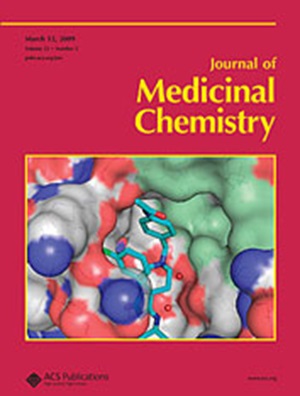A Putative Frizzled 7-Targeting Compound Acts as a Firefly Luciferase Inhibitor
IF 6.8
1区 医学
Q1 CHEMISTRY, MEDICINAL
引用次数: 0
Abstract
The Frizzled family (FZD1–10) of G protein-coupled receptors regulates WNT signaling mediating proliferative input. Dysregulation of FZD7 and exaggerated WNT/β-catenin signaling is frequently observed in intestinal cancers. Therefore, it is attractive to develop therapeutics targeting FZD7 for cancer treatment. Structure-based virtual screening has identified compound 28, which inhibited WNT/β-catenin signaling based on the luciferase-based reporter gene TOPFlash assay. However, upon pharmacological validation, compound 28 rather acts as a potent Firefly luciferase (Fluc) inhibitor (IC50 = 30 nM), matching the reported IC50 for compound 28-mediated inhibition in the TOPFlash assay. Moreover, we employed Fluc-independent assays, a FZD7-focused bioluminescence resonance energy transfer biosensor and quantitative PCR, to emphasize the inability of compound 28 to inhibit the WNT-3A-induced conformational dynamics in FZD7 and transcription of Axin2, a WNT target gene. Thus, we underline the importance of counter screens to validate compounds that interfere with the detection technology used for compound screening.

G 蛋白偶联受体 Frizzled 家族(FZD1-10)调节介导增殖输入的 WNT 信号。在肠癌中经常可以观察到FZD7失调和WNT/β-catenin信号转导异常。因此,开发以 FZD7 为靶点的癌症治疗药物很有吸引力。通过基于荧光素酶的报告基因 TOPFlash 试验,基于结构的虚拟筛选确定了化合物 28,该化合物可抑制 WNT/β-catenin 信号转导。然而,经过药理验证,化合物 28 反而是一种强效的萤火虫荧光素酶(Fluc)抑制剂(IC50 = 30 nM),与报道的化合物 28 在 TOPFlash 试验中介导的抑制作用的 IC50 相吻合。此外,我们还采用了与 Fluc 无关的检测方法,即以 FZD7 为重点的生物发光共振能量转移生物传感器和定量 PCR,以强调化合物 28 无法抑制 WNT-3A 诱导的 FZD7 构象动态和 WNT 靶基因 Axin2 的转录。因此,我们强调了反筛选的重要性,以验证干扰化合物筛选所用检测技术的化合物。
本文章由计算机程序翻译,如有差异,请以英文原文为准。
求助全文
约1分钟内获得全文
求助全文
来源期刊

Journal of Medicinal Chemistry
医学-医药化学
CiteScore
4.00
自引率
11.00%
发文量
804
审稿时长
1.9 months
期刊介绍:
The Journal of Medicinal Chemistry is a prestigious biweekly peer-reviewed publication that focuses on the multifaceted field of medicinal chemistry. Since its inception in 1959 as the Journal of Medicinal and Pharmaceutical Chemistry, it has evolved to become a cornerstone in the dissemination of research findings related to the design, synthesis, and development of therapeutic agents.
The Journal of Medicinal Chemistry is recognized for its significant impact in the scientific community, as evidenced by its 2022 impact factor of 7.3. This metric reflects the journal's influence and the importance of its content in shaping the future of drug discovery and development. The journal serves as a vital resource for chemists, pharmacologists, and other researchers interested in the molecular mechanisms of drug action and the optimization of therapeutic compounds.
 求助内容:
求助内容: 应助结果提醒方式:
应助结果提醒方式:


